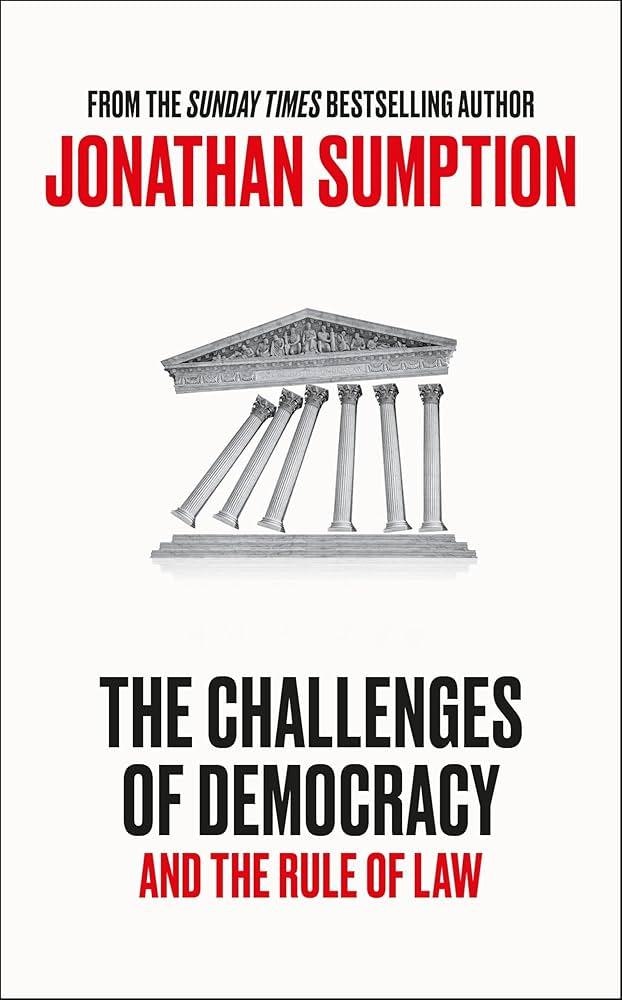This article is taken from the March 2025 issue of The Critic. To get the full magazine why not subscribe? Right now we’re offering five issues for just £10.
This volume of essays under the broad and timely rubric of The Challenges of Democracy neatly complements Jonathan Sumption’s earlier collections Trials of the State (2019) and Law in a Time of Crisis (2021). Once again, Lord Sumption brings legal expertise, a concern for the careful exercise of power and a weather eye for political, social and cultural faultlines to bear upon modern Britain.
Readers will know that he does so from an uncommon combination of intellectual vantage points: a long legal career crowned with membership of the UK Supreme Court, alongside sustained (and prodigious) academic expeditionary warfare, in which Lord Sumption, operating from the Bar and Bench, launched repeated forays into the world of 14th and 15th century medieval history.

£18.99)
These efforts produced his gargantuan five-volume account of the Hundred Years’ War. To labour the obvious, this work well prepared him for commentary on political struggle, economic constraint, the decay of institutions, crises of legitimacy and loyalty and tensions between the ideal and the actual exercise of hard state power. These Lord Sumption tackles with predictable aplomb.
There is no great shortage of Jeremiahs foretelling grave difficulties ahead for liberal democracy, if not its ruin. John Gray’s The New Leviathans (2023) stands out as setting the pessimistic mood music for British liberalism. Is Sumption similarly gloomy? His prognosis is mixed:
“The British state, like other Western democracies, faces very serious challenges. Pressure for a more authoritarian model of democracy will intensify in the coming years. In important areas of our national life, these pressures will probably prevail over the liberal instincts that were taken for granted a generation ago. I do not welcome this prospect.”
Yet Sumption is not a doom-monger: “But I think the cultural and institutional foundations of our democracy will probably survive.” Phew, I suppose.
This focus on the cultural and institutional foundations of British democracy leads Sumption to make the case for a restrained, almost austere liberalism. A short essay on legal philosophy (“The Legitimacy of Law”) offers a characteristic attack on judicial activism, on what Sumption sees as “judges … giving effect to their own policies” — not least through the ECHR.
Lord Sumption alleges a creeping idealism in British legal culture, criticising those who “redefine democracy as a system of values that they associate with judicial lawmaking and of which they happen to approve”. Against this legal (and judge-centred) “model of public rights”, Sumption proposes a robustly political regime. His vision of a salvageable 21st century democracy is built squarely on an orthodox account of the supremacy of political institutions: “For Britain, parliament is the only show in town.”
So far, so good. But this essay and its companion (“Entrenching Rights: the Rule of Law and Human Rights”) perhaps build a little too confidently upon a lawyerly worldview. For Sumption, “legitimacy is based on a collective loyalty to a method of making law”. The legislative process comes close to elision with the political constitution and is theorised as a form of collective choice.
Sumption contrasts collective choice with other accounts of rights. “For most of human history, rights were regarded as part of the moral law, ordained by God.” The modern alternative to collective choice is, apparently, “ideology”. God and ideology are quickly dismissed: “These are all highly authoritarian systems.”
At one point, Sumption lists “less benign” sources of legitimacy, lumping together “Communism, Fascism, Catholicism, Islamism and a variety of nationalist ideologies”. It feels a little overdone to put, say, contemporary Catholic natural law theorists in quite the same bracket as unrepentant tankies or National Socialists.
Legitimacy grounded solely in “loyalty to a method of making law” feels somewhat removed from how law’s subjects actually receive it. Moral content, concepts of natural order, state sovereignty and national or class solidarity are all capable of featuring in descriptive — as opposed to prescriptive — accounts of law’s legitimacy in the eyes of the citizenry. Some will find the procedural liberalism of collective choice rather thin.
Other essays range further afield. Sumption’s sorties into Strasbourg jurisprudence and the roles of international tribunals are apposite now. A final essay on free speech is a plea for public political rationalism. An American piece covers Trump, criminal immunity and the need to reform the presidency.
The stand-out piece might be “Hong Kong: A Modern Tragedy”, containing as it does both a potted constitutional history of the former British colony and a poignant reflection on Lord Sumption’s principled decision last year finally to resign from its Court of Final Appeal.






